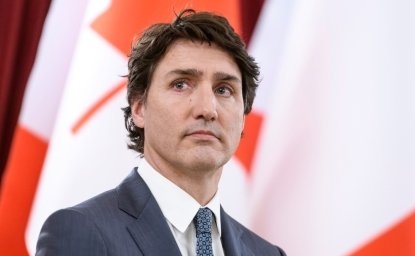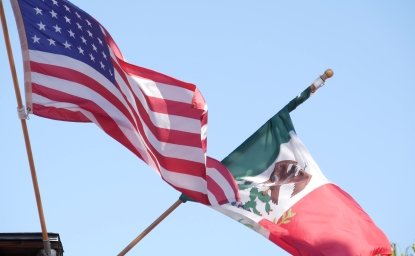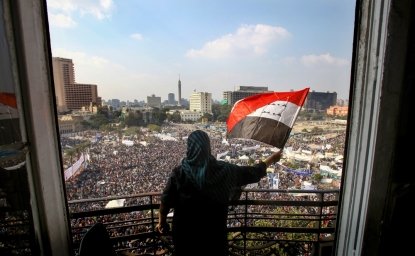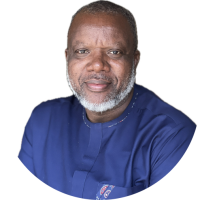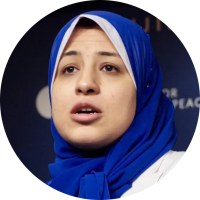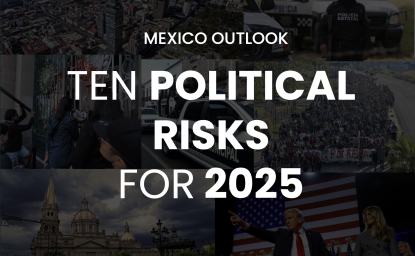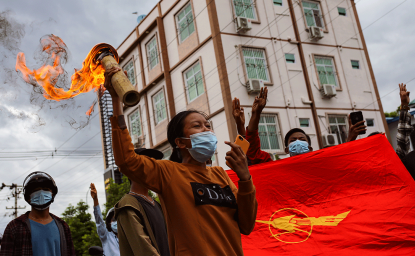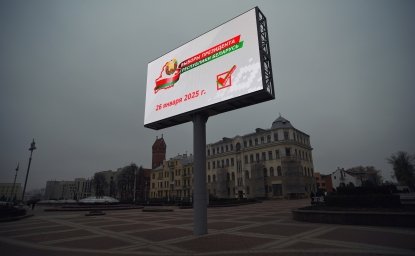THIS IS AN UNEDITED TRANSCRIPT
Hello, I'm John Milewski, and this is Wilson Center NOW, a production of the Woodrow Wilson International Center for Scholars.
Let me introduce you to our guests. Joining us today is Rawia Tawfik. Rawia is a visiting associate professor at the Council on African Studies at the Macmillan Center for International and Area Studies at Yale University. She's also a professor at Cairo University. Also with us, Charles Ukeje. Charles is a professor of international relations at Obafemi Awolowo University in Nigeria.
Earlier today at the Wilson Center, they participated in an Africa program event that was co-sponsored by the Social Science Research Council. The title of that event was TRENDLines and Transformations in African Democratic Governance Lessons for 21st Century U.S. Africa Relations. We're going to sort of continue that discussion, but I want to let you know if you'd like to watch that longer discussion that also involved a representative from the United States Department of State.
You can come to the Wilson Center website. Click on the programs tab. You'll find the Africa program where you can find the events tab and look at past events. And that entire broadcast is available to you. Charles Rawya, thanks for doing double duty today, appearing in the event that appearing on Wilson Center now. Great to have you. Thank you.
Thank you for having us. So if I could ask you to begin, if it's possible to generalize, I know we're talking about an entire continent. You know, we often we have the bad habit of talking about Africa as if it's one place. But of course, it's not. But is there a general statement you can make about trend lines as it relates to democratic governance?
For example, this Freedom House report that shows a ten year decline? Of course, that's always uneven. There are bright spots and there are dark spots. But what's a general a sense of what you could provide our viewers with of how things are trending? Romeo, let's begin with you. Please. As you mentioned, it's very hard to to make generalizations.
So I think if I make a statement, that would it would be that we are witnessing a divided continent. That's even how I teach it to my students. So when we look at the map, we're going to find a specific trends based on regions less. Let's say that. So we have a declining trend in West Africa, for instance, for the for the coups, the wave of coups.
In the last few years, we certainly have declined in North Africa, the region where I come from, including in Sudan, where we had, you know, a positive trend ten, 12 years ago after the North Africa uprisings. But again, it did not last, you know, for a long time, unfortunately. And we had counter-revolutionary regimes taking the path towards authoritarianism.
So it's a divided continent. And we can look at it in terms of of, you know, taking a regional focus, basically, I think in southern Africa, that's where things are doing better. We have, you know, a sustained democracy, an institutionalization of the rule of law for peaceful alternation of power. And that has been, you know, the trend over the last 20 or 20, 25 years.
So it's you know, so it depends on the region, basically. Thank you, Charles. Your thoughts on a general overview. Thank you very much for having me on. I think that it's important to keep in mind you rightly said that Africa is not a monolithic space. Africa is 55 countries and this 55 countries have a huge diversity in terms of the good, the bad and the ugly in terms of democratic governance.
So on one extreme, perhaps you have a country like Sudan, but also new countries that are falling under military rule. Like Mali, Burkina Faso and Niger. But on the other extreme to go to, you have countries like Mauritius, you have Senegal, you have even even Botswana that are doing well. And in recent times, you can see what has happened in Botswana.
You can see what has happened, you know, in Mali shows you can see what has happened in Egypt. But so is really a continent of mixed bond. And it's important not to generalize about the African experience or the different experiences. I mean, something important not to respond to the continent using, you know, just one brushstroke makes total sense.
But I am going to generalize one more time. Okay. That's in terms of global momentum, right? We've seen populist movements all over the globe, just an election here in the United States where the top two issues were the economy and immigration. And you can see that in parts of Europe, all over the place. Is Africa separate from that momentum or is it part of that momentum, this wave of populism that we've seen certainly in the post-pandemic world?
Well, it's around me. I'd like to hear actually both of your perspectives. So why don't we begin with you, Charles, Since we started with our lesson. Okay. I think that we've seen a very dangerous trend all over the globe, especially in the so-called established democracies in Europe and North America. This morning I was talking about the fact that we've seen the ascendancy of right wing political parties on ideology.
We've seen groups that are phobic in Europe. We've seen riots and protests. That's, you know, that's derived from anti-Semitism. You know, and for me, this this this imposes a challenge because these are also the same countries that have been at the forefront of democracy and democracy promotion. And with the kind of challenges that they face today, I wonder what lessons they'll once, you know, Africa of countries, you know, that are going through maybe slightly different experiences, what lessons you did take and certainly I'm not certain how these countries in Europe and North America with the empire of challenges that they are facing our own, how much they would have time and resources, you know, to
be able to support democracy promotion in Africa. So this is a big challenge, Robin. But for me, I think you're right. We we have seen in some cases, especially with the latest wave of coups, a return of the of the populist, anti-establishment discourse. So, you know, if you hear that even, you know, the the coup leader in Guinea will be kind of reproducing the the narrative of Army secretary that, you know, the first wave of, you know, charismatic African leaders after after independence, the same in Burkina Faso, again referring to Thomas Sankara in the 1980s and his his rhetoric.
But I think the you know, the basic point here is that if you're actually, you know, adopting anti-establishment rhetoric and claiming that you're giving power back to the people and you you're making this move in order to improve people's lives, basically in terms of stability or well-being, but what have you. Are you able to deliver? And I think the last few years are indicating that these new leaders are not able to deliver.
And that is really the yardstick, whether they can really, you know, rise up to the promises of not based on that. Is there a is there a gap between support or desire for democracy and then satisfaction with the results of the democratic leaders currently in power? I think there is and for for many reasons are things. One has to do with the with the economic, you know, delivery of democratic system, which has to do with some structural issues.
Right. So for a sustained 15 years ago, we had this rhetoric of Africa's rise. That's, you know, Africa the best ways to to to make investment, to gain high returns on investment and so on and so forth. The you know, the the youth dividend and and the the need to to kind of give opportunity to this rising youth and so on and so forth.
But again, we would with all the kind of external shocks that we have been having in the last few years with the Russia Ukraine war and other regional international crises, it's actually kind of revealing that there are some structural issues in African economies that cannot be simply dealt with by leaders alone or by simple policies or policy shifts alone.
And on the other hand, we have a trend of democratically elected leaders actually implementing undemocratic and authoritarian practices in Tunisia, for instance, President Sarkozy was elected in 2019 using the momentum of of of young people support and presenting himself as a departure from the past regime that that was actually overthrown in 2010. But he has been running a one man show.
Dissolving parliament, introducing constitutional amendments in order to increase his power. So we have this trend also of what I call democracy. Without democracy, you know, be, you know, representatives being selected or elected in a free way. But then pursuing undemocratic practices. Charles, any any additional thoughts? Yeah, For me, I think that the material base of democracy is facing significant challenge in many African countries.
I think that for growing number of citizens on the continent, from Cairo to Cape Town, the best form that democracy can come from, a foot of people finding that they are not able to make basic, essential living. And so this in itself is a very big problem. And there is a sense in which those who have captured the state are also now increasingly weaponizing poverty.
So what that means basically, is that the people have to contend with a whole lot of issues, including so much infrastructure. So if today you ask questions, yes, a lot of Africans believe that. Subscribe to the whole idea of democracy. Okay. But there's now a gap between those ideals and what they are actually confronting. What is is that when deadly disease in some countries like my own country, Nigeria, that's a huge problem around the crisis of price.
Price hikes, the price of things have grown so bad in many countries, the middle class are disappeared. And, you know, that's how the middle class in most countries are the forefront of of of development, of change. You know, the kind of change that we think about when we talk about democracy and governance. So with this dissipation of the middle class, in many of our countries, democracy is on free fall study.
So, you know, when we look at headlines that reveals what just happened or what's happening now, but lurking in the background, almost like white noise, are these trend lines, right, whether it's demographic changes or maybe impact of climate change and what it's doing to certain industries or certain locales? I want to ask both of you, what are the things you can identify in terms of trend lines, things that may not be in the headlines right now, but are really important for us to understand where things are headed.
Rawia, let's begin with you. I think, you know, news often focus on on on bad story. So we have also kind of good, good news coming from different parts of the continent. I think Charles referred to to Senegal and the election of the youngest democratically elected leader. And, you know, the thing is that in many parts of the continent, there is a need to change.
You know, there is an aspiration for change, whatever this change of heading, I mean, trying something different, trying in youth, thinking new policies is is what is aspired for. We have seen that in South Africa. Also, after years of the ANC sustaining a majority, it lost its majority and was forced into, you know, a coalition government. So that there are also cases where the you know, there is a capitalization on the relatively open public space in order to try to put pressure on the government to reverse policies.
We have seen that in the protests in Kenya for instance, against the new taxes that were actually led to reversing this policy. So we're seeing some kind of good news from every corner of the of the continent, actually. I mean, you got it right. But good news, don't sell or it's bad news ourselves. But there's definitely a handful of good news happening, you know, in different parts of the continent.
I'm I had mentioned earlier, Botswana has over six decades, the ruling party completely collapsed. Okay. In Mauritius, the same thing. In fact, in the case of Mauritius, the ruling party has virtually lost, you know, all the local subnational governments, you know, seats. You know, so we've seen these things happening. And I think what's what we miss is probably to multiply them to scale them and to make them sustainable.
I mean, for me, this is probably the challenge. Another thing I see is how, you know, civil society, in spite of all the challenges they face, continue to struggle, you know, continue to contend, you know, with estate in in in different African countries in very, very difficult circumstances, in very difficult situations. And I think this is why I feel that it's important that all hands on deck, you know, not just from within, but also from outside, that we need to ensure that civil space, you know, does not constrict any for that, because if we lose the civic space, if the civic space continues to decline, then we probably would have lost much more than when
we have authoritarian governments, you know, holding swing countries. They are probably the last bastion in many countries in society is probably the last bastion. You know, for democratic consolidation, democratic advancement. You know, and if we lose the civil society, then will probably would be much more costlier. Thank you, Charles, about those things that have worked and the notion of are they scalable, Right.
Or can they apply in other circumstances? What are the main barriers to taking things that are working in one country and applying them to other situations? Does it come down to funding? Is it political will? Are there cultural barriers? What are the issues involved in that? I think it's important to bear in mind that different countries have different situations, different contexts.
What you can, for instance, apply in in predominantly Muslim, Islamic, Northern Africa will probably not walk in. President Mali, Christian, you know, countries, you know, in West Africa or in Southern Africa. So I think that what is important is to ensure that, you know, different country experiences, you know, are brought to bear in terms of, you know, trying to understand what is possible.
I believe, for instance, that, you know, for me, if you take, for instance, youth across Africa, what on two thirds of the population in many instances are young people and they are doing amazing things. And we need to support those. We need to support them in the spaces that it walking. They're walking around issues of, you know, apartment walking that they are setting up stops, they are walking around governance piece on security issues.
We need to support these things. And for me, I think that young people in Nigeria, you know, London, lot of lessons from young people in Kenya and this can be reproduced, you know, across Australia in the age of technology, you know, where, you know, young people have access to, you know, social media and through a process of diffusion, they are able to walk together and to learn from the experiences of the up here in other countries.
Really what Charles was just talking about, young people and the emergence of youth leaders. Are you seeing that in the areas that you work in? Are we seeing a next generation stepping up to the plate? Definitely. But they're very much frustrated by the established and even the new political elite. In the case of Sudan, for instance, we know that, you know, the youth groups basically played an instrumental role in overthrowing al-Bashir regime.
But then you have a very militarized context in Sudan, where the need was not just a transformation or a transfer from from authoritarianism to democracy, but also from war to peace in many parts of the country and from an economy that benefited a few to economic transformation to benefit the many. And this did not happen and collapsed into the world that we have been witnessing for almost two years now.
So it depends very much on the context, whether it's actually kind of empowering to to use, whether the new political movements can actually engage these youth and and institution are the role or whether they feel actually, you know, left out and, you know, facing new challenges, including the current war that that is going on in Sudan. Charles, you mentioned the civic space and then also in your last answer, you started to talk about social media technology.
You know, I mean, we've seen examples around the world where new technologies, the way we communicate and the way it's evolving has been part of a solution. We've also seen where it's the problem, frankly, right. Where whether it's misinformation or disinformation, what does the information ecosphere look like in the 55 plus nations that we're talking about? And are?
Do we see trends there that show either a breakdown of traditional media or a rise of new media or and media, of course, having an intimate relationship with democratic governance? Right. It's hard to have one without the other. Yes. First and foremost, we've seen in the media space the predominance, the dominance of young people, especially in the new media.
Traditional media are becoming a force in a lot of challenges. I can't remember the last time I bought a newspaper, for instance. I don't have a need for newspaper. I can get all the information I need, you know, on social media. What are your what are you reading? Newspapers online. I read them online. Yeah, I read them online.
So. So what I'm saying therefore, is that that's we've seen a shift from traditional media to much more digitalized, you know, media space that become also very democratic. Okay. And most predominantly young people are in that space. A lot of young people are in that space. And what it means is that it has become that such a space has become that space where they can express themselves.
And you can see how if you want to understand any country in Africa today, you just need to see what young people, you know, that are dominant in terms of demographics are seen in those spaces because for them they are cool space. Okay, that's a cool space for them. That is a space where they express themselves. Unfortunately, we are also beginning to see that space is in its own challenges.
Its government recognizes increasingly that these spaces, you know, need to be checked. Government is investing a lot in terms of technology that allows them to turn on social media, for instance. Government is many governments are investing in new legislation, investing in new legislations. You know, now we control and tame the social media. And so basically young people and governments are finding themselves in contention in that space.
What would be the long term implications of this for young people and their ability to express themselves? The jury's out. But I do think that so long as governments see the new media space, as a space that's on the mind, rigid security, regime integrity, they will find themselves on a collision course with those who use the space. And these are mostly young people.
Raw, I want to give you do you want to say anything about the media discussion before I move on to another topic? I agree with Charles, basically that this is this has been, you know, an alternative media for some time. But, you know, again, autocratic regimes are modernizing their toolbox and they're kind of, again, trying to reach out to some people using these same tools.
And they are increasing their censorship over independent pages, Facebook pages and other, you know, platforms that have been used in the past to promote transparency and and accountability and so on. So I thank you. I want to ask now about foreign the role of foreign actors. Right. And I guess like media, we're talking about a double edged sword where they can help with the situation or they can be exploitive in their interactions with other countries and they can make things worse.
I know today you had the opportunity, both of you, to talk directly to someone from the U.S. Department of State and give some advice to the U.S. and how it should approach its relations with various nations. Talk to us about what we're seeing across the African continent in terms of the changing dynamics of foreign investment or foreign involvement and is this good news for democratic governance or bad news for democratic governance?
And I know as soon as I ask the question, of course, it's always a mixed bag, right? It's never one thing or the other. But let's get your thoughts on that. So I do want to start I. Yes, unfortunately, it has been, you know, basically bad news. Again, in a country like Sudan, where it's a very crowded kind of landscape of different regional international actors, we have see that, you know, military support and, you know, economic support has been channeled to military actors while the very brief period of of civilian rule or civilian military partnership, to put it that way, was not actually supported or not supported enough, unfortunately, by by Western Democratic government and
was not supported at all, of course, by regional actors who consider democracy to be an existential threat to them and a threat to the to the regime survival. So it's mostly, you know, bad news. And unfortunately, even Western democracies are kind of giving priority sometimes to stability over democracy, sometimes to their interest with these regional bad actors that may be more strategic and more important to their interest in other parts of the world than in Africa, which is unfortunately not gaining much traction from from these Western circles.
Thanks. I would add that it's clear that over the years, I mean, recent times, Africa has become a space where all kinds of foreign actors come to experiment. You could see, for instance, the fact that apart from US-Africa relations, you have UK Africa relations, you have China Africa relations, you have Turkey, Africa relations, India, Russia and so on and so forth.
And we've seen essentially a situation in which you have what, for want of a better word, I can call it, in lateral multilateralism, one in which the country, maybe a country in the West, a country in the East, you know, sees Africa, brings the whole of Africa together for some form of engagement. And for me, I must show that I don't think that this kind of engagement, you know, even though it looks like multilateralism and everybody wants multilateralism, but in fact, it is essentially the projection of power is essentially the projection of power by these countries.
And you find countries like Turkey in the mix. You know, I'm much I don't think it is helpful for the continent because basically what happens is that all of the 55 African countries offering to fall as. Depending on how you're counting, you know, basically go to those meetings and they tell them what they think they should be doing.
You know, it becomes this peaceful projection of power. You know, I'm interested. More often than not to the detriment of, you know, the different African countries at the end of the day, you go to these meetings and nothing comes out of it. Or not only photo ops, you know. And for me, this is why I believe that Africa's destiny lies business in its own hands, you know, And we the continent, should cultivate partners that can, you know, support it rather than look down on it.
I want to ask each of you a final question in that, you know, a discussion like this, there's not a beginning or an ending, right? Because we're talking about a continuum. Right. It's things change and keeps. That's never a straight line. So just give our viewers and listeners some tips on what you will be watching in the coming months.
Are there any upcoming negotiations or elections or other situations that you'll be following that you think could be significant as we try to figure out these trend lines over the long haul? Roland, let's start with you. What will you be watching in the coming months? I think, of course, for for personal interests, but also for the fact that Sudan is the worst humanitarian crisis now on the continent.
I think we need to be watching Sudan, since this, unfortunately, has not attracted, you know, much attention. So there the unfolding of of the of the crisis in Sudan, whether the new administration in the US will be, you know, able to give some attention to this humanitarian crisis will be something to watch. But also the fact that, as I said, the the the wave of coups in the last few years actually were supposed to, you know, bring to power military leaders for a short period.
And and there should be elections sometime down the road. And we have seen in the cases of Mali, in the case of Burkina Faso, indefinite delays. So whether actually, as I said at the beginning, this new regime that are not delivering and at the same time delaying elections, whether masses will actually be happy with with, you know, these political developments in the same way that they welcomed at least some of them welcomed this coup, that the beginning or will there be a wave of mass uprisings in these countries against these incumbent regimes that, you know, are not democratic and are not even able to deliver stability or development?
Thanks, Carlos. I think for me, first and foremost, I'll be watching what is going to happen with the second coming of Trump, President Donald Trump, because I think that what happens to the United States, what happens in the United States, is going to have, you know, a whole lot of impacts of Africa. I'm not sure that we should we should give benefit of the doubt that the first Trump administration would be different, even though there is no optimism in this regard.
So let's see what happens. For me, this is very important. Secondly, we're beginning to see, you know, trends on the continent that should worry. Of course, you know, everyone had thought that we had gone over and above with coups. But, you know, we've seen three countries and maybe two that did not succeed. We need to worry about the growing franchise of terrorism on the continent.
You know, for instance, today, the most ruthless terrorist group is the Boko Haram in the north east of Nigeria and around the Lake Chad and Cameroon. But we also seen a new terrorist group emerging in northwest Nigeria. You know, that is gaining fast, gaining ground. So there's a whole lot of concern that if this continues for Nigeria, it will have systemic impact, not just for Nigeria, but also for the whole of the area, you know, Nigeria's neighbors.
So for me, these are two things that I mean, that we really have to watch. Thank you very much, bro. We a tough week, Charles, UK. Thanks for sharing your knowledge and insights with us today in two events. Right. Earlier with the Africa program and today on this edition of Wilson Center. Now, we really appreciate it. Thank you.
Thank you very much. Thank you for having me. Thank you for having us. Chess, we hope you enjoyed this edition of Wilson Center now and that you'll join us again soon. Until then, for all of us at the center, I'm John Milewski. Thanks for your time and interest.



